In episode 4 of our "Driving Place-Based Innovation" podcast series, in partnership with the NewcastleGateshead Initiative, we'll demonstrate how technology can shape better places. We'll highlight how accessibility and inclusion can be facilitated through innovative uses of technology. The NewcastleGateshead Initiative, WelcoMe, and Planet Abled, share their efforts towards making travel something everyone can enjoy.
You can listen to the episode here 👇
NewcastleGateshead Initiative & WelcoMe
The NewcastleGateshead Initiative is developing and implementing its Tourism Strategy and Destination Management Plans for the next ten years to transform the destination into being completely inclusive for all demographics. To help achieve this ambition they have partnered with WelcoMe to roll out the accessibility platform across the region.
WelcoMe is an online portal that improves the tourism experience for disabled people and supports them at venues by training front-line staff to make appropriate adaptations to suit the individual needs of each visitor and explain how to interact with disabled customers. WelcoMe is a customer service team that helps disabled people to dictate the level of service they need. This digital service also triggers training for staff members so that they know how to interact when someone arrives at their building. WelcoMe recognises the importance of customer service for disabled people and wants to find ways to improve in-person interactions, not only for the visitor but also for the service personnel.
How Technology Makes Places More Accessible
Technology is a gateway, not the end result. Technology is a conduit for improved human communication, which is at the core of what WelcoMe tries to facilitate. For example, as a mobility instructor, you can observe interactions from a distance between a customer service representative and a blind customer with a guide dog and wonder why the staff didn't introduce themselves given that the customer can't read their name badge. This kind of interaction is clearly not appropriate, even though the staff member has undergone disability awareness training. It's important to understand that traditional training doesn't fully prepare people for in-person interactions.
In 2003, someone attended a training session with their guide dog and used voiceover technology on Apple. This led WelcoMe's founder to consider how voiceover technology might help clients and the company was established to enable direct communication with the customer service team before clients walk through the door. This platform empowers disabled people to control the level of service they need, meaning that for the first time, the individual needs and desires of disabled people are recognised and the experience is tailored to do things that they actually want.
Collaboration to Embrace Accessibility
In 2018, WelcoMe was launched across five venues in Edinburgh and is now available in 170 venues across the UK. Partnering with the NewcastleGateshead Initiative creates a phenomenal opportunity for the North East of England, and will mean the region will climb to first or second in terms of having the highest number of venues on the platform.
Technology can be valuable for the transformation of the visitor economy and the user journey, for example, by providing signage for car parks, facilitating purchases and also advertising products through digital display boards. While these are nice to have, it's important to think about how destinations can engage with communities facing barriers in accessing the visitor economy. Disabled people need to be encouraged and given the confidence to visit a destination.
The NewcastleGateshead Initiative works across all aspects of the visitor economy. They frequently have conversations with venues, so that businesses and visitors are confident that the right adaptations are made to improve accessibility for disabled travellers. Customer service is key to welcoming visitors and ensuring they feel valued. The aim is to provide equitable experiences and a level playing field for all travellers. This can be achieved through 360-degree filming at locations, meaning that visitors can fully plan their trip before arriving at the destination.
Improving User Experiences Through Technology
There are so-called 'technophobes' that dislike using technology. However, this only represents a small and decreasing fraction of people because technology has become increasingly accessible and people are more reliant on their mobile phones. Similarly, WelcoMe are aware that some elderly people don't know how to use technology, so it was important to develop a platform that helps customer service personnel to learn and deliver better experiences.
WelcoMe has developed a solution that helps everyone through technology. By training client-facing members of staff to give better customer service, future customers will also get better service as the staff members have been trained and made aware of different types of disabilities. This helps to build a bridge between technology users and technophobes.
The app has gone a step further as it trains staff members about how to accommodate the needs of disabled visitors and how to make the correct adaptations to their services. Rather than only being an app, WelcoMe is a web app which is connected to the Internet. The WelcoMe platform looks and acts like an app, but is embedded on company websites through a widget. It also means that there isn't a need to download a specific app and the customer can go straight to their online WelcoMe profile and choose any participating venue. This also means that more people can be reached and obtain better customer service specific to their unique needs. Using a widget means that WelcoMe doesn't take up phone memory space, but appears like an app - with the user-friendliness that this entails.
Creating a Vision Using Technology to Shape Tourism
The NewcastleGateshead Initiative is attempting to create a strong vision for North East England's tourism industry, starting with place-based innovation in the Newcastle area. There is a need for developing clusters and for organisations to work together. The NewcastleGateshead Initiative hope to double the size of North East England's visitor economy, to reach £10 billion annually.
Technology will play a huge role for Generation Z, especially through mobile apps. This generation represents the future of the travel industry and keeping up with consumer trends is extremely important - hence research and data are essential. Technology can be considered as the enabler. Tourism will still be experience-driven and people will still come to destinations, but they will start to use technology more often across the user journey and technology will inspire visitors, for example, through Virtual Reality tours to preview destinations. Technology can also enable in-destination experiences and give attraction information and facilitate bookings.
Travel apps can help create personalised experiences and destinations have the opportunity to better engage with people as they leave the destination. Technology can be used to thank tourists for selecting the destination and contributing to the local economy, while also asking for feedback and encouraging social sharing of the trip. The NewcastleGateshead Initiative stay in contact with past travellers through social media and the Geordie Street app to promote neighbourhoods; whereby they contact users and share promotions to encourage repeat visits.
Destinations need to consider how to support the tourism ecosystem and offer great experiences. Destinations should always think about how they can make better experiences, with technology playing a strong role in this regard. While technology replaces people in other industries, this is not the case in tourism. Technology may enhance the experience, but you can never take people out of the destination. If businesses are confident with using apps and know want the visitor wants, then they will give better visitor experiences. This shows how technology can help augment experiences.
Creating a Testbed in the North East of England
WelcoMe saw an amazing opportunity in Newcastle since there are currently no venues in the city on the platform. Working with the NewcastleGateshead Initiative enables the solution to be immediately available in all sectors of the visitor economy.
Customer service is everywhere; there is a first point of contact for everybody. WelcoMe focuses on all sectors of the tourism and hospitality industry and is designed for all types of disabilities. Charities tend to focus on specific types of disability, but WelcoMe has 31 different disabilities included on the platform. The platform also includes the option of sharing an undisclosed condition since 70% of disabled people have hidden conditions and without technology only get the opportunity to discuss their impairments when first meeting customer service personnel. These types of conversations about disabilities and accessibility requirements are not easy to have on the spot, but WelcoMe's platform helps to have discrete conversations to build friendships and remove misunderstandings before visitors arrive, meaning the physical conversation can be started in a professional, friendly and informed manner.
WelcoMe evolved as a company over four or five years. Through the partnership with the NewcastleGateshead Initiative, they have the opportunity to roll out quickly in a specific area; providing the same services with only minor tweaks across the different sectors of the visitor economy. WelcoMe's offering isn't available anywhere else in the world and can be replicable across the UK and beyond.
The Importance of Innovation
Innovation has its early roots in the regional development of the North East of England. Innovation never stops; it always looks forward and tries to evolve! The North East of England is one of the most innovative parts of the country, with the inauguration of the Darlington to Stockton railway 200 years ago, and industrial heritage through shipbuilding and coal mining. One of the largest pieces of innovation in the region is the development of a new conference centre, which uses energy from water in disused coal mines as its power source.
The North East of England has a great visitor economy, where businesses are willing to try new things and experiment with different types of innovations. Recently, Maldron Hotel started using butler robots to help staff during busy periods. There's also lots of innovation in terms of listed buildings. Innovation is focused on making improvements, which sounds like it would cost a lot, but it doesn't have to.
Working with WelcoMe helps to bring innovation to the next level and consider how to bring new technology and expertise to help the business community. On this front, there are 2 levels of consideration:
- How to help as many businesses as possible?
- How to be more granular to help individual businesses that want to innovate faster.
The NewcastleGateshead Initiative also instils innovation within the national tourism awards. For example, they are specifying minimum requirements for the accessibility category in the regional tourism awards to show how businesses have made a significant difference based on their actual implementation, as opposed to just ticking boxes. They are also ensuring that the judges for the accessibility category have lived experiences because they know about the different challenges faced by disabled people and which businesses or solutions are performing best in meeting the needs of this market.
Destinations want to be better than each other, but in terms of accessible tourism, it is about leading others so that they can follow and show what is possible. We're successful as a country when we work together and share best practices.
Challenges of Innovation
In terms of challenges, it goes back to the purpose of innovation and doing something new that no one has done before. Innovation comes at a cost, not just financially, but also emotionally and physically. The personal cost is tough and there is a need for champions so that you can identify the right opportunities and maximise them. It's challenging to wait to find the right champions to make the innovation spark and prosper. Unless you have someone out there who is prepared to share your invention with the world, then you will get nowhere, regardless of how good your idea is. When big brands can spend large amounts of money on advertising campaigns, having a champion is key to being heard.
Planet Abled
Planet Abled makes travel accessible and inclusive for people with different types of disabilities. The business was launched due to the founder's personal experiences and lack of opportunities to travel as a child due to having disabled parents, which made travel inaccessible. The founder recognised that the barriers to travel for people with disabilities were not financial, but more related to the inaccessibility of destinations, the social stigma of disabled people travelling and the insensitive attitudes of people in the destination.
After a series of arguments regarding access requirements, the founder tried looking for a solution and struggled to find an option that worked for her family, since all of the available solutions had been focused on specific disabilities and not an inclusive approach that considered Universal Accessibility Design. The founder believed that there was a better solution that could be created, but had doubts about whether it would be a financially viable business. After spending a few years researching, she decided to quit her job and created Planet Abled.
Planet Abled creates travel services for people with all types of disabilities. It launched by providing local day trips in Delhi to build trust among the disabled community by showing that they can go on holiday, but also to show the industry that accessible tourism will benefit their business and show why they should attract disabled travellers. What started as a service provider creating experiences for disabled travellers evolved into focusing on destination development because no one in the industry knew how to adequately become an accessible destination. Planet Abled started to audit locations to see if they are accessible and identify what can be done with the available resources to improve accessibility and to train and sensitise staff, guides and transport providers about how to interact and cater for disabled customers.
Planet Abled also do an accessibility assessment for each traveller to identify their individual accessibility needs; recognising that every disabled person has varying needs and requirements. Each accessibility assessment is standardised to ensure that the travel sector is prepared to cater for disabled travellers before their arrival. There is also a need to map people's interests to the different experiences in each destination.
Planet Abled also created inclusive group trips, including people with different types of disabilities and even those who aren't disabled. Planet Abled also consult businesses to advise them on how to become more inclusive. They also provide training and standardisation so that businesses can independently improve their accessible tourism offering without the need for a travel concierge, which offers a more affordable option for businesses wanting to attract this market. This helps to create a global standard for accessibility in the tourism industry.
Collaboration Opportunities
A large part of creating new collaboration opportunities lies in researching and identifying the right people to work with. There is a lack of awareness about accessibility and inclusion in the tourism industry. Accessible tourism is not considered a big business opportunity as people assume that this market doesn't have much money to spend on travel.
To overcome these preconceptions, collaboration becomes important to identify those partners that understand the sensitivities of travelling as a disabled person and are willing to put in the effort to adapt their offering to meet the needs of this market. Businesses should truly recognise the unique benefits of creating amazing memories for travellers with disabilities and shouldn't only consider the profit-making opportunities. It is a gradual process of finding people who are willing to experiment and collaborate to design accessible travel solutions. There is a need to align with the needs of travellers, while also understanding the limitations of suppliers in terms of finding adequate workarounds and solutions.
How to Become an Accessible Destination
The first step to achieving accessibility is to overcome the stereotype that accessible tourism is just about providing wheelchair access, which only represents 10-12% of the disabled population. This preconception is valid across tourism operators in developing and developed countries. The remaining 90% of disabled travellers are not accounted for by the majority of operators in terms of making appropriate adaptations to their needs, such as digital accessibility, communication, information and human accessibility. There are so many people with visible or invisible disabilities and their access needs are different.
The second step is to recognise that accessible tourism is a virtually untapped $13.1 trillion market and forget the preconceptions that disabled people don't travel because of their lack of finances. Businesses should consider disabled people as equitably paying customers and create services and accessibility for them. Accessible tourism should become mainstream and companies should ask all their customers about their accessibility needs and how they can provide the best service for them. With 15% of the global population having some form of accessibility need, everyone working in tourism and hospitality needs to understand that they will encounter visitors with a disability throughout their career.
Disabled people should be better represented in leadership roles so that they can become ambassadors and internal champions for accessibility in the workplace. Accessible tourism shouldn't just focus on making adaptations for visitors, but also for employees.
Using Technology to Cater for Everybody
Technology is a game-changer and it's hard to imagine life without it. The same applies to its application in the tourism industry. There are lots of great technological solutions; from improving navigation for blind people, to remote communication for people who are deaf and smart light and sounds for people with sensory needs.
If integrated into the mainstream, technology not only enables travel for disabled people but can create better experiences for non-disabled travellers too. As an example, laptops and keyboards have become so mainstream that people forget that they superseded the typewriter, which was an accessibility solution invented for the blind to write letters. Voice-enabled technology, such as Alexa and Google Home, was created so people with serious mobile impairments can have better control of their surrounding environments. These examples show that technology has the potential to go beyond its original purpose and serve a larger audience.
Key Pillars for Enabling Accessible Tourism
It might seem overwhelming for businesses when talking about the range of different accessibility needs. The first step should be to consider the travel content they produce and if their company websites are accessible. Of the main holiday booking platforms, only Expedia is digitally accessible. There are a lot of different technologies that can be easily integrated to optimise just this one interface, such as manipulating colours to bring out certain elements, accent and changed contrast levels, voiceover and sign language video overlays.
Any conversation about accessible tourism tends to be focused on developed nations. However, there are a lot of differences between businesses in developing and developed countries. More websites are accessible in the United States because of the ADA Standards for Accessible Design course, which has been offered for approximately 32 years, but digital accessibility still needs further improvement in Asian and European countries. Awareness is slowly growing, but it is still not at the required level.
There is a large amount of travel content generated every day, but audio descriptions and captions are lacking in these inspirational travel videos. There is also a lack of consideration for people with sound or light sensitivity during video production, where there is the possibility to add sound modulations for people who have specific triggers. Therefore, accessibility should be thought about across all facets of a business or destination, including marketing activities and content production.
Innovation for Accessibility
Globally, there is a lot of innovation in the accessibility space. However, these solutions are not integrated and tend to be regional in focus. The different platforms don't work with each other, reducing the possibility to replicate successful solutions in different countries. There shouldn't be a need to reinvent the wheel when there are already good solutions available. It's important to create spaces where the creators of these technologies can come together, learn from each other and create collaborative opportunities.
Legal compliance shouldn't be the main reason for prioritising accessible travel. Instead, it should be due to the desire for creating experiences that can be had by everyone. Innovation should be purpose-driven with a passion and desire to do the right thing at the heart of the decision-making process.
There are amazing leaps in indoor navigation - of which the technology has been around for almost a decade - but it still only exists in a few parts of the world and still hasn't found its way into the mainstream. Businesses aren't investing in this type of technology and it's tough for these technological solutions to enter the market as there is little funding to scale initiatives. Venture capital funding tends to go into education and fintech, but the inclusion and accessibility aspects are missing. The businesses that are funded often channelise their solutions through the non-profit and disability community and are not mainstreaming their technology for the wide range of different impairment types. With lots of sign language platforms being created to counteract the lack of sign language interpreters, technology can create solutions that empower disabled travellers.
Conclusion
Amazing things are happening regarding accessible travel, but they need to be replicated and mainstreamed! Technology is an enabler to shape better places and improve the experiences available in a destination for everyone. This innovation process and testbed piloting should be guided by a clear vision and strategy to achieve the goals set by destinations and the businesses operating within them. With Millennials and Generation Z growing up with an acute awareness of the benefits of technology, and becoming ever more reliant on it, travel apps are becoming an essential element for destination management. It's important to do research and monitor the latest trends in terms of the different types of technologies available and to consider their potential application within a tourism context. Technology can be used for inspiring visitors before arrival, augmenting their in-destination visitor experiences and also monitoring and engaging with past visitors to encourage repeat visits.
While technology is of relevance to the majority of travellers, it is especially important in its capability to be a gateway for becoming a fully inclusive destination that considers the unique needs of individual travellers, especially those with physical, sensory or mental impairments through an understanding of Universal Accessibility Design. This helps to build trust and confidence among a demographic which has traditionally been excluded from the tourism sector. With disabled people representing 15% of the global population, it shows the significance of ensuring that accessible tourism is incorporated into destination and business planning. There is a need to remove the preconceptions that financial barriers prevent disabled people from travelling and the social stigma around disabilities, especially in developing nations where these remain rife.
Through using technology to boost accessible tourism, it becomes possible to have discrete conversations and improve customer service to create better experiences. Having a clear understanding of each disabled traveller's specific needs in terms of required service adaptations and their holiday desires helps to open new opportunities and empowers individuals. A key part of this process is the ability to use technology to personalise experiences and help tourism professionals understand the sensitivities of travelling as a disabled person and to raise awareness about how to interact with guests in a more appropriate and respectful manner. By using technology to train staff during real-life interactions, the pitfalls of theoretical disability training can be counteracted and help drive real change within destinations.
Technological developments shouldn't just be focused on app development, but also consider all aspects of the user journey and how it can be improved, for example, through enhancing digital accessibility. A clear understanding of an organisation's resources and constraints is also needed before designing solutions, ensuring that ideas can be implemented with the right support and prioritisation.
Technological innovations need champions who can promote their transformational effects and also identify and foster collaboration opportunities. There is a need to improve the integration between different solutions. Destinations should not be competing in terms of making tourism accessible, but they should help and follow each other to ensure equitable travel globally. In this regard, increased diversity is needed in leadership positions so that inclusive and accessible technologies can be developed by people with lived experiences of the accessibility issues faced.
The podcast is part of the Hospitality Innovation Tourism Supply (HITS) programme which provides targeted support, learning resources and grant funding to businesses in Northumberland, Newcastle and North Tyneside to help make their ideas a reality. The programme is funded by North of Tyne Combined Authority and delivered by NewcastleGateshead Initiative, Food and Drink North East and NBSL.






.svg)



.webp)

.webp)


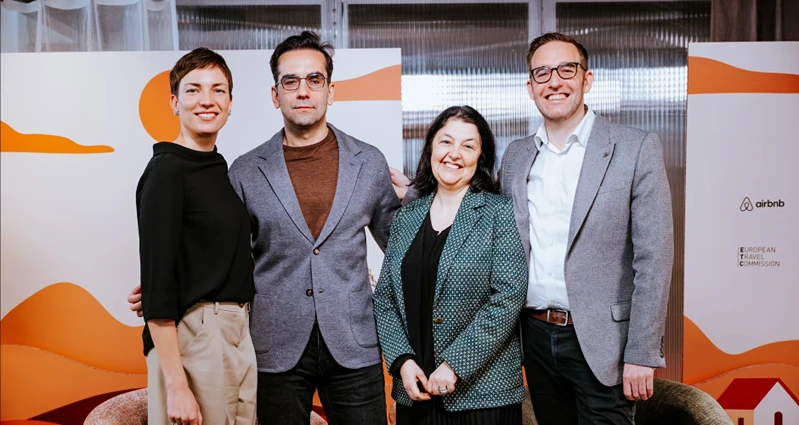
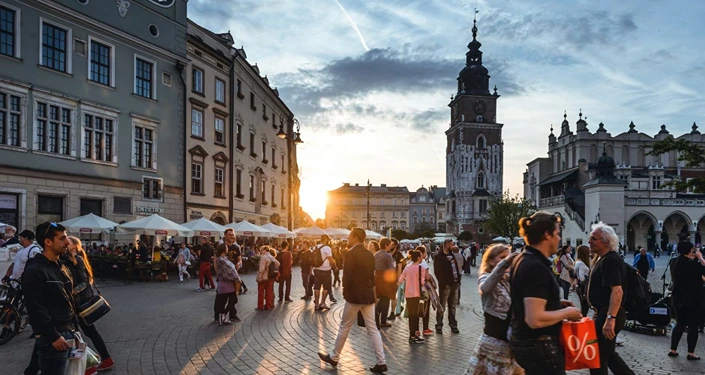
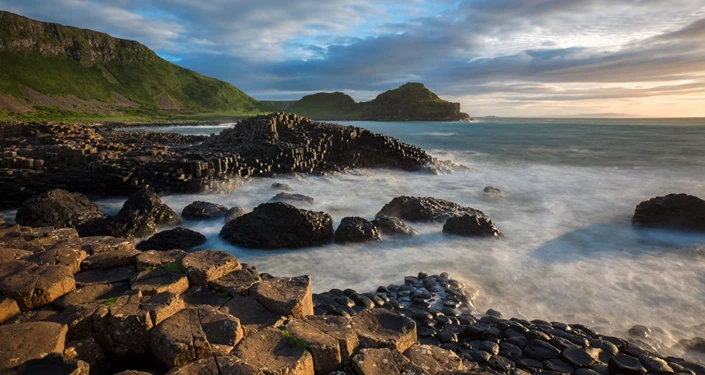
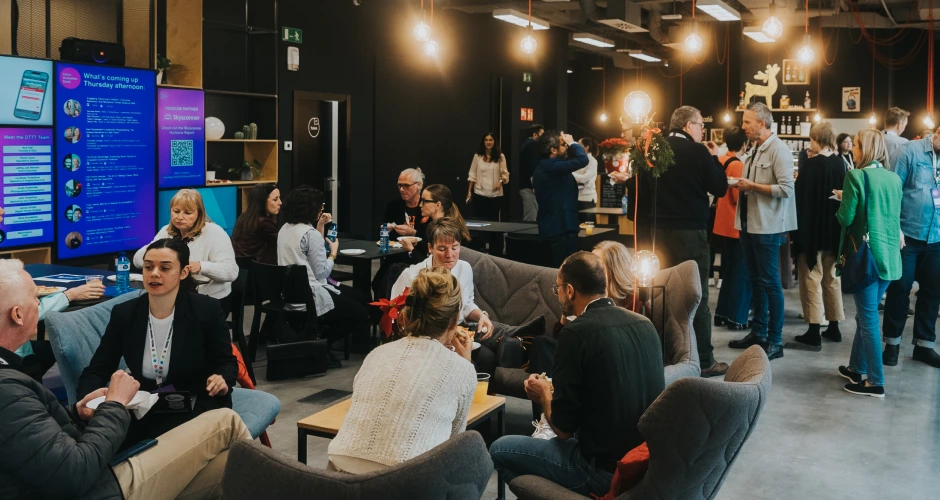
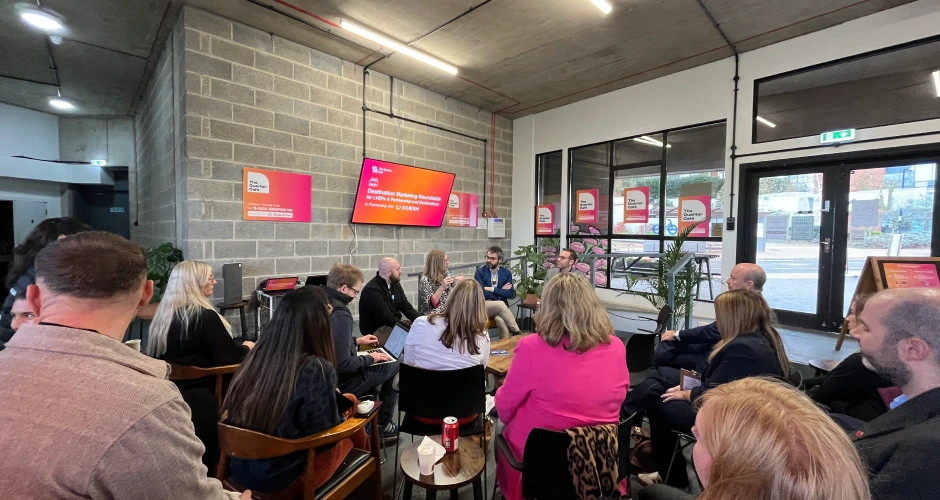



.webp)
